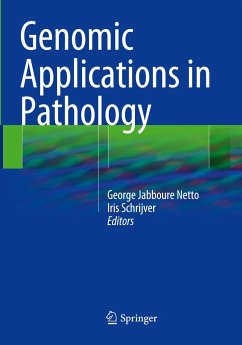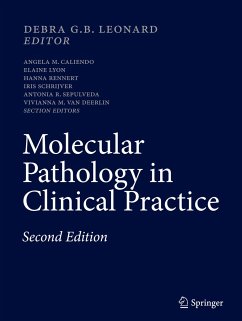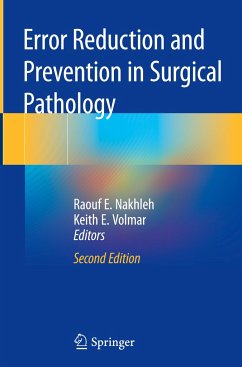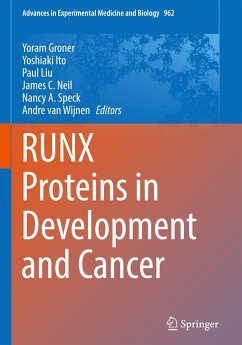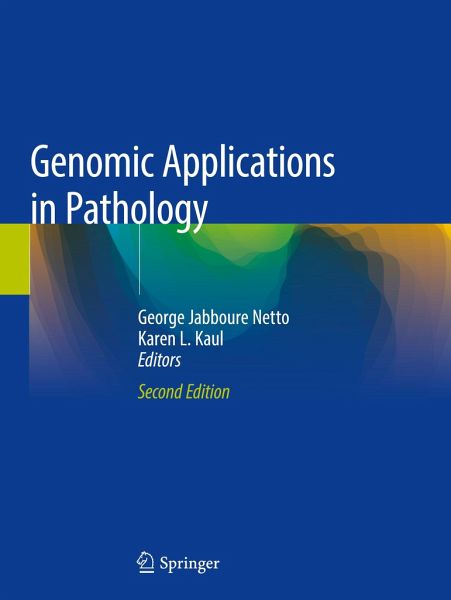
Genomic Applications in Pathology

PAYBACK Punkte
84 °P sammeln!
The recent advances in genomics are continuing to reshape our approach to diagnostics, prognostics and therapeutics in oncologic and other disorders. A paradigm shift in pharmacogenomics and in the diagnosis of genetic inherited diseases and infectious diseases is unfolding as the result of implementation of next generation genomic technologies. With rapidly growing knowledge and applications driving this revolution, along with significant technologic and cost changes, genomic approaches are becoming the primary methods in many laboratories and for many diseases.As a result, a plethora of clin...
The recent advances in genomics are continuing to reshape our approach to diagnostics, prognostics and therapeutics in oncologic and other disorders. A paradigm shift in pharmacogenomics and in the diagnosis of genetic inherited diseases and infectious diseases is unfolding as the result of implementation of next generation genomic technologies. With rapidly growing knowledge and applications driving this revolution, along with significant technologic and cost changes, genomic approaches are becoming the primary methods in many laboratories and for many diseases.
As a result, a plethora of clinical genomic applications have been implemented in diagnostic pathology laboratories, and the applications and demands continue to evolve rapidly. This has created a tremendous need for a comprehensive resource on genomic applications in clinical and anatomic pathology. We believe that our current textbook provides such a resource to practicing molecular pathologists,hematopathologists and other subspecialized pathologists, general pathologists, pathology and other trainees, oncologists, geneticists and a growing spectrum of other clinicians. With periodic updates and a sufficiently rapid time from submission to publication, this textbook will be the resource of choice for many professionals and teaching programs. Its focus on genomics parallels the evolution of these technologies as primary methods in the clinical lab. The rapid evolution of genomics and its applications in medicine necessitates the (frequent) updating of this publication.
This text will provide a state-of-the art review of the scientific principles underlying next generation genomic technologies and the required bioinformatics approaches to analyses of the daunting amount of data generated by current and emerging genomic technologies. Implementation roadmaps for various clinical assays such as single gene, gene panels, whole exome and whole genome assays will bediscussed together with issues related to reporting and the pathologist's role in interpretation and clinical integration of genomic tests results. Genomic applications for site-specific solid tumors and hematologic neoplasms will be detailed. Genomic applications in pharmacogenomics, inherited genetic diseases and infectious diseases will also be discussed. The latest iteration of practice recommendations or guidelines in genomic testing put forth by stakeholder professional organizations such as the College of American Pathology and the Association for Molecular Pathology, will be discussed as well as regulatory issues and laboratory accreditation related to genomic testing. All chapters will be written by experts in their fields and will include the most up to date scientific and clinical information.
As a result, a plethora of clinical genomic applications have been implemented in diagnostic pathology laboratories, and the applications and demands continue to evolve rapidly. This has created a tremendous need for a comprehensive resource on genomic applications in clinical and anatomic pathology. We believe that our current textbook provides such a resource to practicing molecular pathologists,hematopathologists and other subspecialized pathologists, general pathologists, pathology and other trainees, oncologists, geneticists and a growing spectrum of other clinicians. With periodic updates and a sufficiently rapid time from submission to publication, this textbook will be the resource of choice for many professionals and teaching programs. Its focus on genomics parallels the evolution of these technologies as primary methods in the clinical lab. The rapid evolution of genomics and its applications in medicine necessitates the (frequent) updating of this publication.
This text will provide a state-of-the art review of the scientific principles underlying next generation genomic technologies and the required bioinformatics approaches to analyses of the daunting amount of data generated by current and emerging genomic technologies. Implementation roadmaps for various clinical assays such as single gene, gene panels, whole exome and whole genome assays will bediscussed together with issues related to reporting and the pathologist's role in interpretation and clinical integration of genomic tests results. Genomic applications for site-specific solid tumors and hematologic neoplasms will be detailed. Genomic applications in pharmacogenomics, inherited genetic diseases and infectious diseases will also be discussed. The latest iteration of practice recommendations or guidelines in genomic testing put forth by stakeholder professional organizations such as the College of American Pathology and the Association for Molecular Pathology, will be discussed as well as regulatory issues and laboratory accreditation related to genomic testing. All chapters will be written by experts in their fields and will include the most up to date scientific and clinical information.



